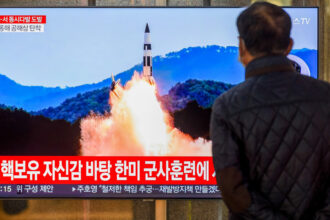As Israeli troops sought to drive away Hamas militants still engaged in combat in southern Israel, Israel claimed on Monday that it has conducted hundreds of airstrikes against Hamas sites in the Gaza Strip.
Lt. Col. Richard Hecht, a spokesman for the Israeli military, told reporters that battle was still continuing on in seven to eight locations throughout Israel and that it was taking longer than anticipated to fend off the incursion that started on Saturday.
Lt. Col. Jonathan Conricus, a different official, claimed Israel had called up 100,000 reserve soldiers.
In a video uploaded on X, Conricus stated, “Our job is to make sure that at the end of this war, Hamas will no longer have any military capabilities to threaten Israeli civilians with.” “On top of that, we are to make sure that Hamas cannot rule the Gaza Strip.”
According to Conricus, over 1,000 terrorists from the Gaza Strip infiltrated Israel as part of the Hamas offensive on Israeli communities near the Gaza Strip. 700 civilians and Israeli soldiers were killed in the attack, while more than 2,100 people were hurt.
Conricus declared, “It is by far the worst day in Israeli history.”
At least four Americans were among the deceased, according to U.S. Senate Majority Leader Chuck Schumer, and more people are certain to die.
“The viciousness and brutality of this unprecedented attack from Hamas targeting innocent civilians — children, families, seniors — is overwhelming and heart-wrenching,” Schumer said following a briefing from U.S. national security leaders.
According to representatives from various countries, citizens from Britain, France, Nepal, Thailand, and Ukraine were also among the deceased in Israel.
Housing complexes, tunnels, a Hamas intelligence facility, a weapons manufacturing facility, and the residences of senior Hamas figures have all been damaged by Israeli aircraft in Gaza. According to the Palestinian health ministry, 413 Palestinians have died.
Since the conflict started on Saturday, the UN said that more than 123,000 people in Gaza have been internally displaced.
On Sunday, the Israeli government formally declared war on Hamas.
This war will rage for a while. The Israeli prime minister, Benjamin Netanyahu, predicted that it would be challenging.
Hamas “opened the gates of hell” with its unexpected attack, according to Maj. Gen. Ghassan Alian, a top Israel Defence Forces official, and “will bear the responsibility and pay for its deeds.”
READ ALSO: Two Israelis were wounded in an occupied East Jerusalem shooting
The United States, according to Secretary of State Antony Blinken, “will continue to work to ensure Israel has what it needs to protect its citizens and to secure the release of hostages.”
When speaking with Israeli Defence Minister Yoav Gallant over the phone on Sunday, U.S. Defence Secretary Lloyd Austin offered his support. The Pentagon has ordered a Navy aircraft carrier to move to the eastern Mediterranean and is sending equipment and weapons to support Israel.
Four battles have been fought between Hamas and Israel since Hamas seized control of Gaza in 2007.
Israel maintains a siege surrounding the region, and Netanyahu declared that Israel would stop supplying Gaza with fuel, power, and other items.
Israeli troops were searching for militants while Israeli domestic worker Vivian Nomalanga Bhebhe, a Zimbabwean, who has been living and working in Tel Aviv since 2017, told VOA that residents were being urged to stay inside.
“It’s going to be a difficult week for all of us here because we don’t know what we expect,” Bhebhe said, referring to the anticipated Israeli operations in Gaza and the ensuing Hamas retribution.
Egypt has frequently been a significant player in arranging a cease-fire during earlier wars between Israeli military forces and Palestinian terrorists.
While China has close ties to Israel, Chang Teng-chi, chair of Taiwan University’s political science department and an expert in Chinese diplomacy, told VOA that while other nations also have influence in the region, it “may be difficult for China to play a mediating role.”
According to Chang, “China’s main dealings are limited to the Palestinian Authority, and it has no significant ties to Hamas.”
Although Blinken claimed the fighting had subsided, the Israeli army and Hezbollah terrorists near the Lebanese border resumed gunfire on Sunday, raising the risk of a larger clash.
Despite the fact that Israel and Lebanon are regarded as foes, they have maintained their 2006 cease-fire for the most part, with the exception of the occasional tiny rocket attacks from Lebanon that Israel has responded to with counterattacks.






![Cars swept away by water after floods preceded by heavy rains caused the river to overflow its banks in the town of Alora, Malaga [Gregorio Marrero/AP Photo]](https://obasanjonews.com/wp-content/uploads/2024/10/Cars-swept-away-by-water-after-floods-3-330x220.jpg)
![US President Joe Biden closes the Democratic National Convention's opening night on August 19 [Paul Sancya/AP Photo]](https://obasanjonews.com/wp-content/uploads/2024/08/President-Joe-Biden-2-330x220.jpg)
